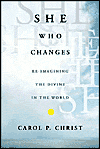
For readers who prefer to think for themselves and are weary of Goddess 101 and spell cookbooks, She Who Changes is an oasis in the desert. This is a book you can sink your intellectual teeth into. On nearly every page, you’ll find yourself underlining and exclaiming, “Yess!”
She Who Changes is an introduction to process philosophy (or theology or thealogy), which was invented in the 20th century by Alfred North Whitehead (1861-1947) and Charles Hartshorne (1897-2000). Whitehead was a mathematician/philosopher whose books are addressed to other philosophers; regular people like us find his work exceedingly difficult and opaque. Hartshorne, while more accessible and a self-confessed feminist, does not, Christ says, fully express feminist process philosophy. (How could he?) In her always lucid prose, Christ writes about her experience at Yale (where she was “taller and blonder” than her classmates, nearly all male) and in theology classes where her professors dismissed anything vaguely feminist as worthless. (In one footnote, she refers to medieval rabbis who opined that women could listen to their discussions but would do better to serve as “footstools” for the rabbis.) As she relates in her earlier books, Christ became disillusioned with “classic theism” and found the Goddess.
Process philosophy, Christ writes, states that “all life is in process, changing and developing, growing and dying, and that even the divine power [whom she calls Goddess/God] participates in changing life” (p. 3). If you’re a neopagan who actually thinks about what you profess to believe, then you may have come to process philosophy intuitively. You already understand that everything is alive, that “feeling, sympathy, relationship, creativity, freedom, and enjoyment are the fundamental threads that unite all beings in the universe, including particles of atoms and the divinity” (p. 3). You are already aware of the web of life that includes people, plants, and rocks. For traditional theologians, the fathers of the standard-brand churches, many Buddhist and Hindu teachers, and the Great Thinkers—philosophers from Descartes on; these guys were all upperclass, Eurocentric white men—“man” is the ideal human. “Man” controls his body, lives in his head (when Descartes was declaring, “I think, therefore I am,” who was cooking his supper?), is “independent of relationship,” (that’s gooey girl-stuff), and does not let his emotions interfere with his judgment. Process philosophy, by contrast, “affirms the body-mind continuum [and] makes qualities and capacities that have been associated with weakness, vulnerability, and women central. It is not surprising,” Christ says, “that process philosophy might cause traditional thinkers to feel uncomfortable” (p. 24). Is this an understatement, or what?
Hartshorne identified the “six common theological mistakes of classical theism”: (1) God is perfect and therefore unchangeable. (2) omnipotence, (3) omniscience, (4) God’s unsympathetic goodness, (5) “immortality as a career after death,” and (6) revelation as infallible. Christ devotes a chapter to each mistake. She shows how belief in the theological mistakes has created a world where war is popular, women and children are the poorest of the poor, and numerous plant and animal species are either extinct or nearly extinct. As we already know, people who have all the answers rarely tolerate people who ask sticky questions. The assertions of process philosophy, by contrast, may not necessarily be optimistic, but they characterize the divine and the world realistically and give us “reason for hope.” One assertion, with which we are familiar, is that the planet and the universe itself are the body of Goddess/God. But beware: process philosophy also says that when our body dies, we die too; there’s no oversoul, no reincarnation, no life eternal, no Summerland. The point is that whether we think our life is “good” or “bad,” we should consider all the relationships we have—not only with friends and family but also with Goddess/God and nature—and appreciate and enjoy the life we’ve got.
Chapters 1 to 6 outline what process philosophy is and how it works. In chapters 7 and 8, Christ explains how traditional theology and philosophy are both misogynistic and matricidal and how process philosophy can help us see that “because the world is co-created, every individual act does make a difference, for better or worse, in the web of life. [It] can also help us see that we never act alone, because we are partners with each other and with Goddess/God in the creation of the world in which we live” (p. 191). In chapter 9, she explains how a feminist process paradigm helps us reinvent our religious images, including prayers and rituals, that celebrate the embodied life. This is the life we all lead as long as we’re living on the earth that is the body of Goddess/God.
~review by Barbara Ardinger, Ph.D.
Author: Carol Christ
Palgrave/Macmillan, 2003
